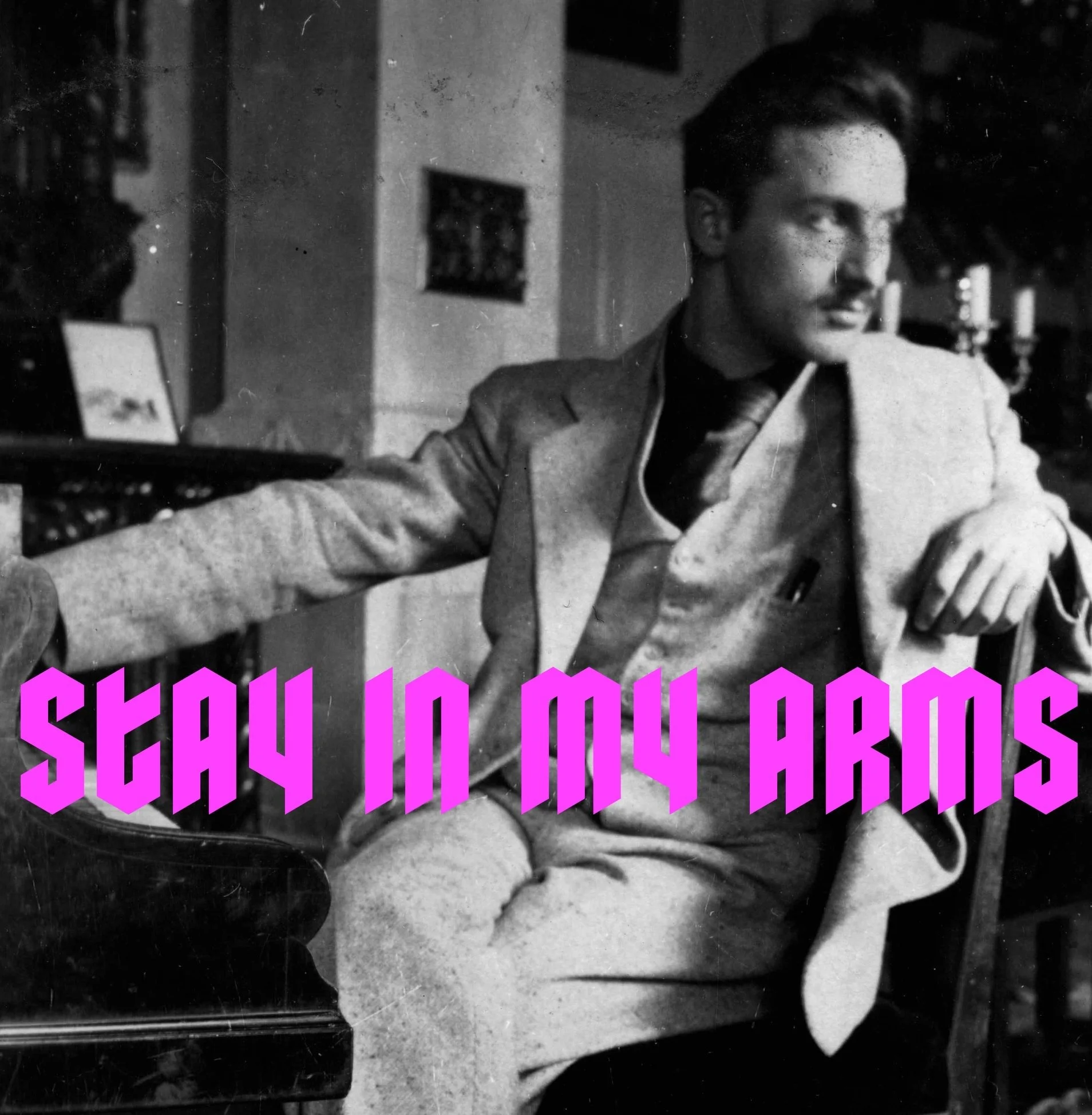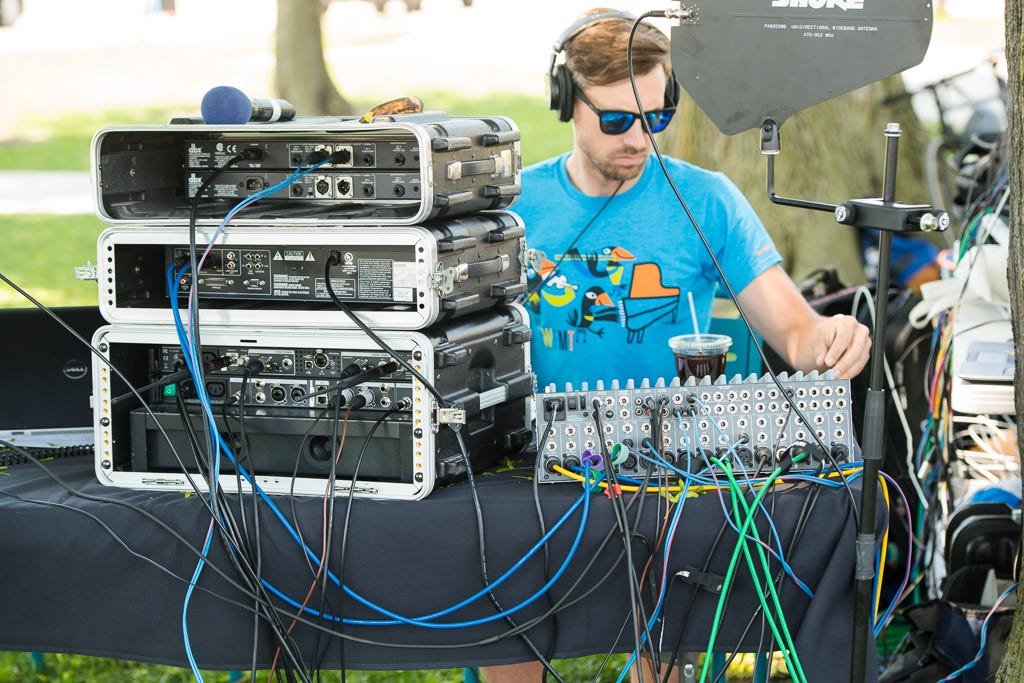Stay In My Arms
I haven’t very much ambition for the mad existence of our time
Art should make us FEEL something
〰️
AI does not
〰️
Art should make us FEEL something 〰️ AI does not 〰️
A good friend recently forwarded me an article about an AI—I hesitate to call them—“band,”1 who are presently racking up 1,400,000 plays per month on Spotify.
Anyone with a brainstem could have seen this coming, but this whole pathetic story made my blood pressure spike like a diabetic’s after a double Whopper with cheese meal.
It was a scant thirteen months ago that I filmed this video featuring Colin Meloy, the songwriter and lead singer for an eminently REAL band, the Decemberists (who get 785,000 monthly listens on Spotify). Host Bill DeVille asked Meloy his thoughts on AI in music:
Which brings us to the Roaring Twenties. No, not the one that the current occupant of the White House claims we are in, but the Roaring NINETEEN Twenties. The age of Gatsby, Duke Ellington, the Harlem Renaissance, flappers, the electric chair. A decade before the Great Depression would wipe out our national wealth and drive millions to deaths of despair.
Two of the more influential composers of the decade were George Gershwin (“Rhapsody in Blue”, “An American in Paris”, etc.) and Cole Porter: songwriter extraordinaire who penned classics like “Just One of Those Things,” “Night and Day,” “Begin the Beguine,” “Easy to Love,” etc. etc. Seriously, just look him up.
One of the forgotten composers of this era, and a direct contemporary of Gershwin, Ellington, and Porter, was Marc Blitzstein. Blitzstein was married to novelist Eva Goldbeck. Goldbeck suffered from an eating disorder and succumbed to breast cancer in 1936.
As many creative types do, Blitzstein attempted to transmute his grief into art. His grief-cycle spawned a popular musical (A Cradle Will Rock) and one of the best art songs I have ever heard: “Stay in My Arms”.
Our tempo’s automatic
Science reveals
Our pace is acrobatic
Life moves on wheels
I nearly flatlined the first time I heard “Stay in My Arms”. The jazz-era harmonies hooked me, but it was the heart-wrenching lyrics: timeless and universal (while at the same time so specific to Blitzstein’s grief over his late spouse) that had me listening to it on repeat—sobbing.
The real clincher is in the coda, which requires the singer, for the first time in the song, to ascend to his falsetto voice—the range of vulnerability—to issue a plea, an anguished cry:
I love you
You love me
That much is plain, dear
The world’s insane, dear:
So stay in my arms
We know by now that his Love is departed, which makes the singer’s anguish that much more acute. Fifteen years after my first listen, I still get chills every time.
Let’s see AI conjure that.
Blitzstein (1905-1964). Beaten to death at age 59 outside of a Gay bar in Martinique
Opus 18, No.4
A pedestrian quartet by Beethoven changed the trajectory of my life.
In the 1980s, my parents owned a Zenith record player. It had a plastic silver face, faux wood-grain sides and a tuner display that glowed lime green when switched on. Mom and Dad didn’t own very many LPs — but what they had was gold. Sam Cooke, the Beach Boys, the Beatles, Marvin Gaye, the Temptations: this was the music of their heyday. There was no Beethoven in their collection, no Miles Davis either. No Public Enemy nor Cyndi Lauper, although Dad did love Whitney Houston and kept a copy of her self-titled debut cassette tape in his vehicle for at least a decade after its release. You haven’t lived until you’ve seen a man with a gun rack in the back window of his truck earnestly singing along to “How Will I Know?”
As I became a teen, my parents’ tastes veered more towards Travis Tritt and Randy Travis: countrified tunes that didn’t connect with me. I was soon taking cues from Soundgarden and Pearl Jam. I started playing bass guitar at fourteen and took bass lessons for a short while that spring. By the end of June, I had worked through all the lessons in The Electric Bass Primer, Volume 1. Ray, my bass teacher at Star Guitar, told me to bring in tapes of songs I liked and wanted to learn and he’d teach me to play “by ear”. Ray rolled his eyes when I brought in Nirvana’s “Smells Like Teen Spirit” and “Love Buzz”. He was able to figure out, play, and begin teaching both songs to me in under five minutes. Kurt Cobain was a tortured genius, but Nirvana’s bassist, Krist Novoselic, was white bread — boring and uninspired. I didn’t realize it at the time, but Ray sure did. The next week I brought in “Heart-Shaped Box” and “Polly”. Ray yawned. A couple of months later, I brought my cassette of Dookie to rehearsal and Ray’s eyes lit up. When he heard Green Day’s “Welcome to Paradise” he smiled: Now, there’s a bassline! Let’s get to work.
My interest in Nirvana and Green Day led me directly to an underground, independent punk music scene that was inexplicably flourishing in Minot, North Dakota at the time. Mid-nineties punk legends like Bikini Kill, Godheadsilo, Fitz of Depression and many others played for legions of enthusiastic spike and leather-wearing teens. At my first band’s first show, on a Sunday night, in front of a half dozen friends, I wore an American flag-bedecked motorcycle helmet, with visor down, as I plunked through the set, playing my janky little bass lines.
A decade later, I was still cranking out janky little bass lines, sans motorcycle helmet. During my time in the Navy, I met a couple of guys and invited myself to play bass with them. We’d play Creedence and Jackson 5 cover songs in the dive bars of the Pacific Northwest, Guam, and Virginia.
As I planned for my impending post-military future, I was also embarking on one of my annual existential crises. I was loosely looking into colleges I wanted to attend, but had no clue what I wanted to major in. If hard-pressed, I would venture only a room-temperature response: “something in music?”
Klickitat County (James Rascoe, yours truly, and Jack Brett), circa 2004
I was fortunate enough to have a bevy of free time — as our ship was in dry dock — and signed up for some general education courses at Old Dominion University. My course-load for my first semester at ODU shows the confusion I held for my imminent future: Physics of Sound, Sailing 101, Intro to Creative Writing, and Music Literature Survey. Of the latter, I had no idea what to expect, I just knew I’d probably learn something about music. As it turns out, it was a history of classical music from the Middle Ages to present. One of the requirements of the class was to attend at least two classical recitals per semester and write up concert reports afterward. That assignment led me to Beethoven, and the rest of my life.
The first concert I attended for the class was in September, 2006 at Chandler Hall on the campus of ODU. The Borromeo Quartet was performing Beethoven’s String Quartet in c minor, Op. 18 №4 along with two other string quartets that I have long since forgotten. The hall was intimate but sparsely-attended. By the second bar of the first movement of Op. 18 №4, I was riveted. I would soon discover that there is nothing inherently groundbreaking about Beethoven’s Op. 18 No. 4. It doesn’t represent an evolution in Beethoven’s own compositional style. It is no “Ghost Trio,” no “Pathetique” Sonata, certainly no Symphony №9. It is nearly lost in the classical haystack that also contains Bach’s perfect cello sonatas, Bellini’s operatic arias, and Chopin’s heart-wrenching nocturnes.
But the sound of that quartet in Chandler Hall was as smooth as a good merlot. Wood paneling projected and refined the unamplified violins, viola and cello. The first and second violinists leaned into the music, swaying with the downstrokes. The violist’s eyes flashed back and forth from the cello to the violins, reading them for rhythm, for changes in tempo. The music built to a galloping, swelling ending with all four strings playing three fortissimo triplets in unison. The sparse crowd waited for the reverberation of the final chord to fully decay before applauding the musicians. I had literally never heard music like this before.
When I walked out of Chandler Hall that night, I knew what I wanted to major in. I wanted to preserve that performance. I wanted to put that sound in a jar, and open it up whenever I was feeling hopeless or lost. I wanted to re-create that concert for anyone who couldn’t attend the recital. I wanted to be a classical recording engineer.
One year later, I was living in Chicago, majoring in Audio Arts and Acoustics, and cold-calling local classical groups to see if I could record their recitals. I was volunteering at the CSO and subscribing to BBC Music magazine. By 2010, I was interning at Chicago’s only classical radio station, WFMT. I worked my way up the ranks, from intern to overnight Production Assistant to Recording Engineer — my goal — before moving up to Operations Manager and finally Chief Engineer in 2017.
I can’t listen to any one genre of music for too long without growing a little tired of it, so I listen to all styles, from Billie Holiday to Amalia Rodrigues to Megan Thee Stallion. But every time I hear the Op. 18 №4, I stop whatever I’m doing and fall back in love with classical music.
If Beethoven Owned an iPhone
his symphonies would number not 9, but 2
(perhaps 2 ½, leaving one
“Unfinished” like Bruckner did).
He would check his Twitter mentions
after every performance, scroll
the BBC Music app with each album dropped.
Ghost vibrations would leave incomplete
his Opus 70 Ghost Trio.
Fretting about his branding,
he’d compose and orchestrate his LinkedIn bio.
If his Heiligenstadt Testament
were leaked to Buzzfeed, he’d need to release
a PR video on YouTube,
sit down with Terry Gross,
post pics of his semicolon tattoo.
Conducting his Triple Concerto from the piano,
he might butt-dial that Soprano
he collabed with once, six years ago.
He would totes tote his Zelfie-Schtüken
on his daily walks around @RathausPark.
#NeverNotComposing
He would force his niece
to post TikToks of herself flossing
to his latest mixtape.
On death’s stoop, he’d doomscroll
in a darkened room, puffy undereyes,
shock of iconic hair cast in a sallow blue glow,
pressing the speaker end to his deaf ear,
volume full, feeling fomo
for his protégé’s Première.
#yolo











